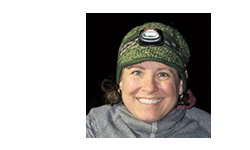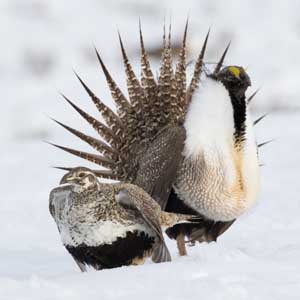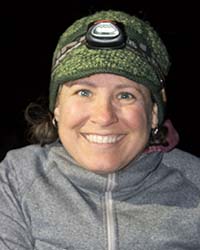
Dr. Gail Patricelli – May 2024
7:00 pm, Tuesday, May 14, 2024
Online via Zoom, Free and open to the public
Registration required. Click here to register for the Zoom webinar.
Robots, Telemetry, and the Sex Lives of Wild Birds: Using Technology to Study Courtship and Conservation

Animals use a dizzying array of sounds, smells, colors, dances, electrical fields, and seismic vibrations to convince each other to mate. These displays, like the song of a cricket or the train of a peacock, are like advertisements by the courting sex tuned to the preferences of the courted sex. But courtship in many species involves more than just advertisements; it also involves negotiation between males and females. Therefore, in addition to elaborate displays, success in courtship may require tactics and social skills. These skills may include, for example, the ability to gather information and adjust courtship behavior in response to the partner’s signals and to the marketplace of other males and females. Dr. Patricelli will discuss her lab’s research on Greater Sage-Grouse, in which they use robotic females to investigate courtship interactions between the sexes and the way habitat structure can affect the flow of information among individuals on the lek breeding grounds. She will also discuss her lab’s ongoing research on how foraging behaviors affect courtship displays in sage-grouse, and how this basic science has informed her lab’s research into human impacts on breeding activities.

Gail Patricelli is a professor in the Department of Evolution and Ecology and chair of the Animal Behavior Graduate Group at the University of California, Davis. She received her Bachelor’s degree in biology and art from Whitman College and her Ph.D. from the University of Maryland, and was a postdoctoral fellow at the Cornell University Lab of Ornithology. Professor Patricelli and members of her lab study the evolution of elaborate courtship behaviors in birds and the impacts of human activities, especially noise pollution, on bird communication, breeding behaviors, and reproductive success. Much of the research in the Patricelli lab addresses sexual selection and the breeding ecology of a species of conservation concern, the Greater Sage-grouse. The lab adapts technology such as biomimetic robotics, microphone arrays, acoustic monitoring, and remote telemetry to study wild populations of sage-grouse and other bird species.


